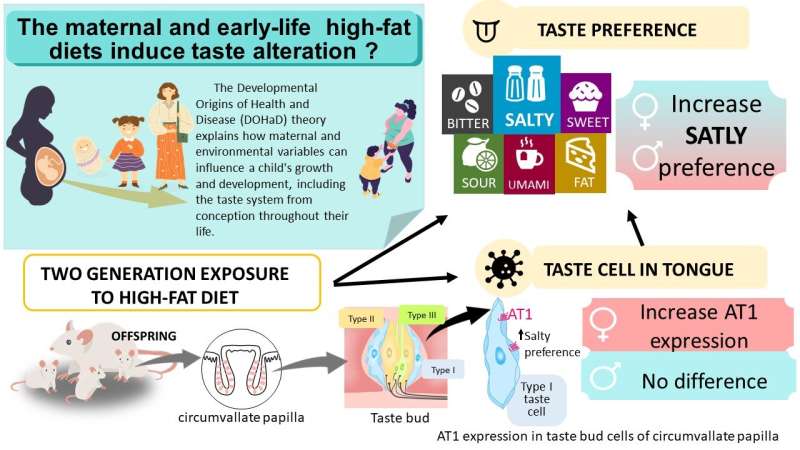This article has been reviewed according to Science X's editorial process and policies. Editors have highlighted the following attributes while ensuring the content's credibility:
fact-checked
peer-reviewed publication
trusted source
proofread
Maternal and early-life high-fat diets found to result in a taste for salty food

We are all aware of the importance of eating healthy food, especially during pregnancy. A high-fat diet has dramatic consequences on the metabolism. It can lead to obesity, diabetes, chronic liver disease, and possibly cancer. Previous works have demonstrated that eating high amounts of fat during pregnancy affects the taste preference and metabolism in offspring.
In most households, children and parents eat the same food. In other words, mums eating a high-fat diet will likely feed their children fatty foods. What are the consequences of maternal and early-life exposure to high amounts of fat on the offspring? This is what researchers from Tokyo Medical and Dental University (TMDU) have explored in a study published in Scientific Reports.
The researchers used a rat model to investigate the effect on taste preference of a two-generational (i.e., pregnant mother and young newborns) exposure to a high-fat diet. Pregnant and lactating females were fed a high-fat diet, while a control group received a standard diet. After weaning, the offspring from each group received the same diet—babies from mothers fed a high-fat diet during pregnancy and those fed a standard diet continued receiving a high-fat diet and a standard diet, respectively.
Young rats from the high-fat diet groups gained more weight and consumed more energy than their counterparts from the standard diet groups.
"We wondered if the different diets had affected the taste preferences of the rats," explains Takashi Ono, senior author. "It is well established that taste impacts food intake. If something tastes good, the brain reward circuits are activated, and you will likely eat more of it."
The researchers tested the animal preference for the five basic tastes: bitter, sour, salty, sweet, and umami, using a two-bottle challenge, in which two bottles—one containing water and the other one water with taste—were added to the rat cage. Offspring exposed to a high-fat diet during gestation and early life preferred salty water. In contrast, they showed no specific preference for the other tastes when compared with the standard-diet group.
What mechanisms underlie this preference? The researchers investigated the levels of proteins involved in perceiving the salty taste. "The protein and gene expression of AT1 increased in the taste buds of female offspring exposed to a high-fat diet. This happened as early as three weeks after birth," explains Saranya Serirukchutarungsee, lead author of the study. "AT1 is known to be associated with a preference for salty taste and evidence suggests that it is likely that AT1 affects the salty taste preference by increasing sodium intake in taste bud cells."
Better understanding of the programming of offspring's eating behavior and taste preferences is vital when considering the strong links between poor diet and poor health. These findings provide a crucial first step that can lead to further studies aimed at reducing the risk of developing obesity and diet-linked diseases, such as cardiovascular disease in offspring and subsequent generations.
More information: Saranya Serirukchutarungsee et al, Two-generation exposure to a high-fat diet induces the change of salty taste preference in rats, Scientific Reports (2023). DOI: 10.1038/s41598-023-31662-0




















